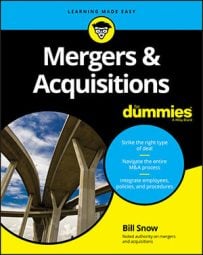If you want to ensure a smooth M&A process, settle any outstanding lawsuits, to the extent possible, before putting your business on the market. Even if you don’t have legal liabilities, you may want to talk to your tax advisor about the tax consequences of the legal organization of the company at time of sale.
Be prepared to talk about current or past lawsuits. Planning to gloss over or omit mention of lawsuits, or simply expecting Buyer to uncover a lawsuit (or criminal investigation) by itself, isn’t smart. These actions indicate that you’re negotiating in bad faith, which means you’ve just kneecapped your credibility. Ideally, you want to be able to honestly say, “We are not aware of any pending lawsuits or investigations.”
The other major legal issue for many deals is the legal organization of the company. In other words, is it an LLC or a corporation (and if it’s a corporation, is it an S-corporation or a C-corporation?). These distinctions are important because they affect the taxation of the business.
An LLC and an S-corporation allow for a single layer of taxation, which means the government taxes a sale of assets once, most likely at the prevailing capital gains rate.
The Seller of a C-corporation, on the other hand, gets hit with two layers of taxation. First, she pays on the proceeds of the sale at the corporation level, and then when the remainder of those proceeds is distributed to the shareholders, the shareholders also pay tax, most likely at the capital gains rate.
This double-whammy means the shareholders of a C-corporation many be looking at receiving less than 50 percent of the gross proceeds. Ouch.
Sellers should speak with their tax advisors prior to pursuing a business sale and set a plan well in advance of the decision to sell. Depending on the company’s legal organization, converting to a different legal entity may make sense tax-wise.
When converting from a C-corporation to an S-corporation, you may need a full decade before the full benefit accrues. And don’t forget to talk to a wealth manager before the decision to go through a sale process. An able advisor can provide you with a structure for a deal that minimizes your tax burden. Don’t wait until after the deal closes to talk with a wealth advisor, or you may be unhappily surprised.

